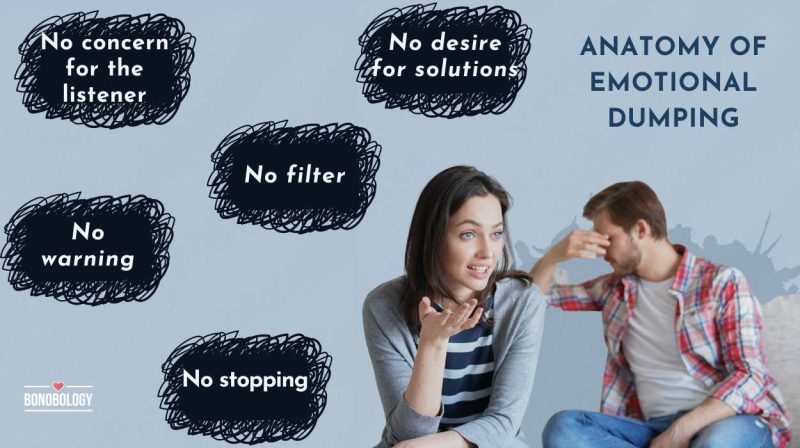We all have days when we itch to pour out our frustrations or worries into a patient ear or two. But, contrary to common assumption, scratching that itch may not bring real relief or resolve emotional knots, science indicates. And it may stress out the listener too. So when is venting problematic? When does airing our feelings go from healthy venting to straight-up emotional dumping? How can we tell the difference? And how can we stop toxic dumping from draining us emotionally?
To get some answers, we got in touch with clinical psychologist Devaleena Ghosh (M.Res, Manchester University), founder of Kornash: The Lifestyle Management School, who specializes in couple’s counseling and family therapy. She gave us some insights on healthy venting vs emotional dumping, how to respond to dumping when it happens frequently, and how to set boundaries when we’ve reached our tipping point, or have begun to feel like an emotional dumpster. And how to do this without losing important relationships.
What Is Emotional Dumping?
Table of Contents
Emotional dumping is when someone (or something) triggers you and you unload all your negative emotions on someone else (or someone unconnected to the event, like a close friend or family member). It happens:
- Without any filter or warning
- Without thinking about how it might make the listener feel
- Without considering if they are in a frame of mind to listen to you at all
So what’s the difference between emotional dumping vs emotional sharing? The latter involves two people honestly sharing their feelings with each other. And it actually makes them feel better. But dumping is a one-way rant that overwhelms the listener. It doesn’t do the speaker much good either. “You don’t do it as a form of self-care. And you certainly don’t care about the person you’re dumping on. Like trauma dumping, emotional dumping in relationships turns toxic when you’re completely unaware of the emotional impact your ranting has on the listener. This is toxic and some people even engage in this behavior to be nasty and malicious,” says Devaleena.
To understand this better, let’s look at some examples of emotional dumping:
- “A close childhood friend started coming to me at all hours of the day and dumping her problems on me. There was no respect for my time and mind space. She wasn’t asking for help and refused to take any responsibility for her bad decisions. It eventually got so emotionally exhausting and toxic that I stopped taking her calls and responding to her texts. It was a friendship breakup,” says Jade, a weaver from Minnesota
- “I had a bad day at work — A misunderstanding with a colleague. When I went home, I dumped my feelings on my partner big time. It took me a few days to realize how unproductive and unfair it was to take out all my anger on someone who had nothing to do with the situation,” recalls Halo, a sales lead from Michigan
Related Reading: Causes & Signs Of An Emotionally Exhausting Relationship And How To Fix Them
What Is Healthy Venting?

When is venting healthy and productive? According to this study, it’s when you talk things through with someone who genuinely understands where you’re coming from or is going through the same thing as you. “It is a healthy exchange where you express your feelings without feeling the need to attack your listener (if they don’t respond the way you want them to). The goal is to get some relief from the underlying frustration, rather than proving yourself right. So, venting to someone can be a way to communicate whatever is upsetting you without blaming anyone,” explains Devaleena. In healthy venting,
- You know what you’re upset about and feel you can express your emotional states in a healthy way
- You have let the listener know that you have something difficult or unpleasant to talk about. And you have asked them if there’s a good time to discuss it, says Devaleena
- You know that venting frustration is a means to an end. And that once you’ve had your say, you will need to move on to productive and positive action. Or talk things out with the person who triggered you in the first place
So is there a difference between complaining and venting? You bet. When you complain, you see things from just one point of view: Your own. But venting to someone is about getting another perspective. Or it can at least help you distill your emotions and quieten the rage sirens in your brain so you can think clearly and figure out what to do next. And therein lies the difference between venting vs ranting, too. While both a vent and a rant stem from stirred-up emotions, ranting involves going on a complaining bender. Whether anyone is listening or not. And it often leaves you angrier or more upset than when you started.
Also, when thinking of venting vs trauma dumping, know that venting involves intentional sharing and practicing healthy emotional boundaries. But trauma dumping is about cornering someone with all the willy-nilly deets on what set you off – To the point of making them want to bolt.
Related Reading: 9 Signs You Are In An Emotionally Draining Relationship
Emotional dumping vs healthy venting
Is venting healthy? It sure can be. Venting negative feelings is one of the most effective strategies for de-escalating anger and calming emotions. Dumping, meanwhile, is the stuff emotionally draining relationships are made of. But often, most people don’t even realize they’re doing it. That’s because venting and dumping aren’t that easy to tell apart. And a lot depends on how the listener sees them. Sometimes, you may think you are only venting or seeking support. But the listener may consider it as dumping. So where does the line between venting vs emotional dumping lie? This table will hopefully help you make a clearer distinction:
| Emotional Dumping | Healthy Venting |
| 1. Emotional dumping is cyclical, self-absorbed, and one-sided. The dumper shows no regard for how the listener may feel about their oversharing | 1. Healthy venting is two-way, considerate, and happens within a specific time frame. It allows the person at the receiving end to remain in a clear and positive headspace and practice active listening |
| 2. A dumper avoids any or all personal responsibility or accountability for whatever triggered their tirade. For them, the problem is always someone else | 2. A venter wants to process what happened, their role in it, and how they feel about it with the listener’s help. They are not looking to pin blame |
| 3. They don’t stick to the issue and launch into a laundry list of other, often unrelated, hurts and grievances to get the listener to take their side | 3. A venter stays on topic. They do not veer off in any and every direction to build their case or get validation |
| 4. They never check whether the listener has the bandwidth to hear them out. And they tend to corner their close friends and loved ones at the most inconvenient of times or places | 4. They ask for permission before sharing their big frustrations or feelings. And they always take the listener’s time and the place into account |
| 5. A dumper is a perpetual victim, but has no real desire to find solutions. So any constructive feedback is most unwelcome | 5. A venter does not self-victimize and is solution-oriented. They seek out and give thought to the listener’s feedback |
7 Signs Of Emotional Dumping
The markers of emotional dumping are manifold. And they aren’t always obvious. But this much is clear: If you let it carry on unchecked and do not lay down emotional dumping boundaries, there’s a high chance of you winding up in a deeply toxic relationship. What’s more, airing every grouse and recounting every hurt ad nauseum could irk your listener. Or even, push them away. It could also keep you stuck in a bad mood. And who needs that!
To curb toxic emotional dumping, it is best to look out for these warning signs and find healthier ways to express difficult and stressful feelings:
1. Your words keep coming up bitter

Some situations and life experiences can leave a bitter taste in the mouth. But what if everything you have to say about someone or something is steeped in bitterness – And you just can’t stop? According to Devaleena, abject bitterness is one of the signs of emotional dumping, especially if:
- You can’t find one positive thing to say about anyone or anything
- You’re convinced that the world is dark and everyone is conspiring against you all the time
- You don’t hesitate to share your bitter tale to the bitter end, out loud, every chance you get
2. You keep repeating yourself
Every conversation you have goes round in circles and comes back to the same thing. You do not try to move on, forgive and forget, make things better, or accept help. Does that ring a bell? Then know that it points to toxic emotional dumping.
Now, imagine a pipeline has burst, and the water is gushing out, all fetid and dark and forceful. That’s what your emotional tirades feel like to those who are at the receiving end, be they close colleagues, friends, loved ones, or family members. There’s nothing healthy or productive about them – It’s just you going on and on, exhausting everyone.
3. You struggle to control your emotions and your words
When those angry or resentful feelings bubble up to the surface:
- You have a hard time keeping a lid on them
- You can’t find a way to talk about your emotional states calmly
- You can’t step back and think about what you want to say
- You can’t decide if something needs to be said at all
If your attempts to vent always end up with you opening the emotional floodgates wide open and letting your emotions run your mouth, take that as a sign of emotion dumping.
Related Reading: Emotional Flooding: What Does It Mean In A Relationship?
4. You find fault, but not with yourself
Whether it’s a bad breakup or relationship trust issues or simply a rough day at work, you know exactly where the blame lies. And it’s never with you.
5. You have the ‘poor me’ syndrome
Emotional dumpers behave as though they’ve been wronged in every situation that doesn’t go their way. They never take personal responsibility and instead cry out: “Poor me. Poor little me. The world is so very unfair, and no matter what I do, nothing goes my way.” Statements like these are classic examples of emotional dumping.
6. You do not want a solution
You don’t really want the listener to provide feedback or help resolve a relationship conflict. You just want to pour out your troubles, unchecked, wherever there’s a willing (or even unwilling!) ear to be found.

7. You don’t feel better after a venting session
Positive venting can be cathartic and bring real relief, especially if we feel we’ve gotten the desired emotional connection or validation from the listener. As per a study, venting is beneficial if the listener has helped us reconstrue and make meaning of, rather than simply recount and relive, an experience. But what if letting off steam and sharing your emotions is making you feel worse, as this study posits? If your venting sessions are feeding your negative emotions, then it could indicate dumping.
Here it is worth bearing the following in mind regarding emotional dumping vs emotional sharing: Emotional sharing is two-way and helps people bond after an emotional episode. Dumping is a one-sided conversation that treats the listener like an emotional dumpster. Neither the dumper nor the listener emerges from it feeling good or particularly close.
Related Reading: Emotional Validation In Relationships – Meaning, Importance, And Signs
7 Ways To Set Boundaries Against Emotional Dumping
Emotional dumping allows the dumper to continue with their negative coping patterns and give in to selfish emotions. By making everything all about them and oversharing to the point of alienating their listener, they also miss out on the very emotional connection they seek. Meanwhile, the listener is left straining under the burden of someone else’s emotions, which only makes them feel exhausted or wiped out emotionally.
If you are at the receiving end of dumping, it is best to let the other person know how it is making you feel and draw some healthy boundaries to protect your emotional health and sanity. Here are some tips on how to respond to emotional dumping, how to stop emotional dumping altogether, and set boundaries:
1. Know and state your limit
So what to say when someone is emotional dumping and you don’t have the bandwidth to listen to them? What if you find their incessant anxiety dumping or stress dumping too much to handle? Practice some self-awareness. Check what it is about their conversation that feels overwhelming, uncomfortable, or toxic. “Your state of awareness of what is emotionally draining for you is something only you can work on,” says Devaleena.
When their emotional rant starts, do acknowledge their emotion, then try saying:
- I understand that you are upset/struggling. But I don’t have the emotional capacity to talk about this right now
- I cannot keep taking on your feelings like this because it makes me feel___. And that’s affecting my mental peace and well-being
- I am finding this conversation too uncomfortable to continue. Can we please discuss something else?
2. Don’t be shy to say ‘no’

We all want to be there for our loved ones and create a safe space for them to express their feelings. But this must not be at the cost of our own emotional well-being. So when you’ve had enough, say so. Be assertive and practice setting emotional boundaries and clear communication. A straight-up ‘no’ to a venting session is our best tip on how to stop emotional dumping in its tracks.
3. Set a timer on emotional conversations
Another great tip on how to respond to emotional dumping or set emotional dumping boundaries with difficult people is to set a time limit on such conversations:
- Tell them upfront that you’re willing to hear them out and communicate openly, but only for a specific amount of time, and then you will need to attend to other things
- Stick to the limit and end the conversation politely, but firmly. If they still want to talk more, fix another time
Related Reading: How Do You Set Emotional Boundaries In Relationships?
4. Put off the conversation
If you aren’t feeling up to sitting through a full-blown ranting session, then ask if you can have the conversation another day when you will be more ready to listen.
5. Encourage them to seek support from other sources
If you notice they are really struggling to process an emotional situation or let go of the past, encourage them to seek professional help. Bonobology’s panel of experienced therapists would be glad to provide guidance or assistance.
6. But don’t become their therapist
Be an active listener by all means. But know the difference between listening vs fixing and try not to, under any circumstance, become their therapist yourself. They probably have a lot of work to do on their own issues and on emotional regulation. And you don’t need that extra stress or toll on your emotional health.
Related Reading: Tips To Practice Emotional Attunement To Transform Your Relationships
7. Understand that you may have to let them go
“Sometimes, we need to realize that a relationship is not so important that we forget ourselves while accommodating the other,” Devaleena says. The most important relationship you’ll ever have is the one you have with yourself. So if setting emotional boundaries does not work, know that there’s nothing wrong with:
- Stepping back from emotionally draining relationships
- Taking a relationship break
- Ending what you thought was a vital friendship to protect your emotional or mental well-being
Key Pointers
- Healthy venting is a two-way conversation that allows you to safely express your emotions and feel better
- Emotional dumping is a one-sided, self-absorbed, negative rant where you show no regard for how it makes the listener feel. It also leaves the speaker feeling worse than when they started
- Dumping is marked by bitterness, a tendency to repeat and rehash negative emotions or situations, a constant struggle to contain your emotions, pin blame, and play the victim, with no inclination to look for solutions
- Setting healthy emotional boundaries, time limits, and walking away, if need be, are some tips on how to cope with dumping of this sort
Emotional dumping in relationships can breed resentment, anger, and eventually cause the listener to withdraw or get out of the relationship altogether. Sure, we all need a shoulder to cry on and someone to hear us out on occasion. But no relationship can sustain if emotion sharing is one-sided and robs the listener of their time and energy.
This article was updated in August 2023.
FAQs
Yes, it can be deeply toxic because there’s no give-and-take. The emotional dumper simply goes on and on about how miserable they are and how unfair their life is, without actually wanting to do anything about it. And they expect the listener to be available to them both mentally and physically at all times. This can turn any relationship toxic.
2. How do you respond when someone is venting?
Practice active listening. Don’t judge or offer solutions right away. Hear them out first. Let the dust of their emotions settle. Then, offer constructive suggestions gently. But keep in mind that they may or may not take your advice, and that’s okay.
3. How do you set boundaries with emotionally draining friends?
To set boundaries, you will have to be assertive and clear. Let your friend know that you can spare some time for them, but that you cannot be unconditionally present and available for them at all times. Tell them that you love them but that you have to take care of yourself and your own life as well.
Accountability In Relationships – Meaning, Importance, And Ways To Show
When You Need To Walk Away From A Relationship: 11 Signs That It’s Time
Your contribution does not constitute a charitable donation. It will allow Bonobology to continue bringing you new and up-to-date information in our pursuit of helping anyone in the world to learn how to do anything.
Ask Our Expert
You must be Logged in to ask a question.



Featured
50 Questions For Premarital Counseling To Prep For Marriage
Why Is Marriage So Hard? Reasons And Ways To Make It Worthwhile
15 Signs Of Being Married To A Narcissist And How to Cope
Building Healthy Boundaries: The Key to Trust and Respect in Relationships
How To Deal With A Negative Spouse – 15 Expert-Backed Tips
What Is A Codependent Marriage? Signs, Causes, And Ways To Fix
7 Signs You Have A Verbally Abusive Wife And 6 Things You Can Do About It
Husband Wife Relationship – 9 Expert Tips To Improve it
12 Hurtful Things You Or Your Partner Should Never Say To Each Other
7 Expert Tips To Resolve Conflict In A Marriage
Rediscover The Spark: How To Fall Back In Love With Your Partner
3 Key Skills To Save Your Marriage & Stop Divorce
Roommate Marriage – Signs And How To Fix It
What To Do When Your Husband Belittles You
How To Deal With A Lying Husband?
Why Am I So Depressed And Lonely In My Marriage?
11 Signs You Have A Narcissistic Wife
21 Signs Of A Narcissistic Husband And How To Cope
7 Fundamentals Of Commitment In A Marriage
17 Positive Signs During Separation That Indicate Reconciliation